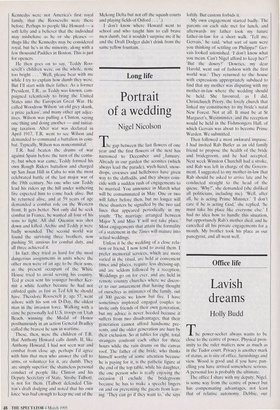Long life
Portrait of a wedding
Nigel Nicolson
he gap between the last flowers of one year and the first flowers of the next has narrowed to December and ,January. Already in our garden the aconites (which always lead the parade), wych-hazel, snow- drops, crocuses and hellebores have given way to the daffodils, and they always coin- cide with a sudden rush of engagements to be married. You announce in March what will be consummated in May. One or two will falter before then, but no longer will these disasters be signalled by the two sad lines that appeared periodically in my youth: 'The marriage arranged between Major X and Miss Y will not take place.' Most engagements that attain the formality of a statement in the Times will mature into actual weddings. Unless it he the wedding of a close rela- tion or friend, I now tend to avoid them. I prefer memorial services, which arc more varied in the ritual, are held at convenient times and places, require less dressing-up, and are seldom followed by a reception. Weddings go on for ever, and are held in remote country churches where we discov- er to our amazement that having thought of ourselves as intimates of the family, out of 300 guests we know but five. I have sometimes implored engaged couples to invite only friends of their own generation, but my advice is never heeded because it suffers from two disadvantages, that their generation cannot afford handsome pre- sents, and the older generation are hurt by their exclusion. So at tables for eight, total strangers confront each other for three. hours while the rain drums on the canvas roof. The father of the bride, who thinks himself worthy of some attention because he is paying for it, is-the pathetic figure at the end of the top table, while his daughter, the one person who is really enjoying the occasion (I exclude the bridegroom because he has to make a speech) lingers on and on preventing the guests from leav- ing. 'They can go if they want to,' she says
loftily. But custom forbids it.
My own engagement started badly. The parents on each side met for lunch, and afterwards my father took my future father-in-law for a short walk. 'Tell me, Gervais,' he said, 'what sort of sum were you thinking of settling on Philippa'?' Ger- vais looked astonished. 'I don't know what you mean. Can't Nigel afford to keep her?' `But the dowry?"Dowries, niy dear Harold, went out of fashion with the first world war.' They returned to the house with expressions appropriately subdued to find that my mother was disputing with niy mother-in-law where the wedding should be held. She favoured, as I did, Christchurch Priory, the lovely church that linked my constituency to my bride's natal New Forest. Not at all. It must he at St Margaret's, Westminster, and the reception would he held in the Fishmongers Hall, of which Gervais was about to become Prime Wardell. We submitted.
Then followed a most awkward impasse. I had invited Rab Butler as an old family friend to propose the health of the bride and bridegroom, and he had accepted. Next week Winston Churchill had a stroke, and Rab was left in charge of the Govern- ment. I suggested to my mother-in-law that Rab should he asked to arrive late and he conducted straight to the head of the queue. 'Why?', she demanded (she disliked all politicians, including me). 'Well, after all, he is acting Prime Minister_' I don't care if he is acting God,' she replied, he must take his place like everyone else.' 1 had no idea how to handle this situation, but opportunely Rab's mother died, and he cancelled all his private engagements for a month. My brother took his place as our panegyrist, and all went well.


























































 Previous page
Previous page